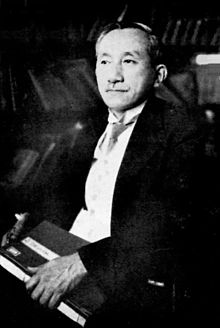Shinmura Izuru
Shinmura Izuru | |
|---|---|
 | |
| Born | October 4, 1876 |
| Died | August 17, 1967(aged 90) |
| Other names | Tân thôn ra |
| Occupation | linguist |
Shinmura Izuru(Tân thôn ra,October 4, 1876 – August 17, 1967)was a Japaneselinguistandessayist.He is best known for his many contributions toJapanese linguisticsandlexicography.In honor of him, theShinmura Izuru Prizeis annually awarded for contributions to linguistics.
Background
[edit]Shinmura was born inYamaguchi prefectureon October 4, 1876. He graduated from theTokyo Imperial Universityin 1899 where he studiedphilologyunder the instruction ofUeda Kazutoshi.Between 1906 and 1909 he studied abroad inEngland,Germany,andFrancewhere he studied linguistics. In 1919 he received aDoctor of Letters.
Career
[edit]In 1902, Shimura taught at Tokyo Higher Normal School, and in 1904 at Tokyo Imperial University. After returning from studying abroad, he taught atKyoto Imperial Universityfor a number of years.
Shinmura introduced western linguists to Japan and created the fundamental foundation of modern Japanese linguistics. His research included a study of the historical development of theJapanese language,a comparative study of Japanese with neighboring languages, and etymology. He also made important contributions to the study of 16–17th-centuryChristianmissionaries in Japan.[1][2][3][4]
During his career, Shinmura compiled a number ofJapanese dictionaries:Jien(Từ uyển,lit. "Garden of words" )in 1935,Genrin(Ngôn lâm,lit. "Forest of words" )in 1949, andKōjien(Quảng từ uyển,lit. "Wide garden of words" )in 1955, for which he is most known.[2][3]
In 1956 Shinmura was awarded theOrder of Culturefor his many contributions.[1][2][3]
Major works
[edit]- Nanban Sarasa,Kaizōsha, 1924
- Nanban Kōki,Iwanami Shoten, 1925
- Tōhō Gengoshi Sōkō,Iwanami Shoten, 1927
- Tōa Gogen Shi,Oka Shoin, 1930
- Genrin,Zenkoku Shobō, 1949
- Kōjien,Iwanami Shoten, 1955
Notes
[edit]References
[edit]- Encyclopædia Britannica(in Japanese).Encyclopædia Britannica, Inc.2007.
- My Pedia(in Japanese).Heibonsha.2004.
- Nihon Kokugo Daijiten(in Japanese). Vol. 7.Shōgakukan.2000–2002.ISBN4-09-521007-9.
- Nihon Rekishi Daijiten(in Japanese). Vol. 2.Shōgakukan.2000–2001.ISBN4-09-523002-9.
- Linguists from Japan
- Japanese essayists
- Japanese Esperantists
- Japanese expatriates in the United Kingdom
- Japanese expatriates in Germany
- Japanese expatriates in France
- Recipients of the Order of Culture
- Academic staff of Kyoto University
- University of Tokyo alumni
- People from Yamaguchi Prefecture
- 1876 births
- 1967 deaths
